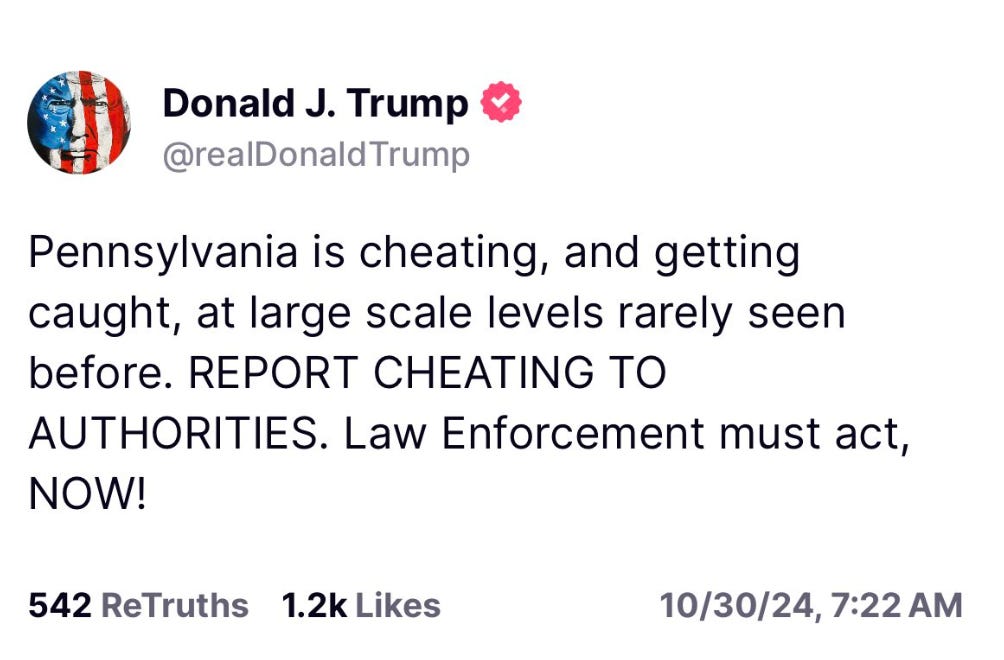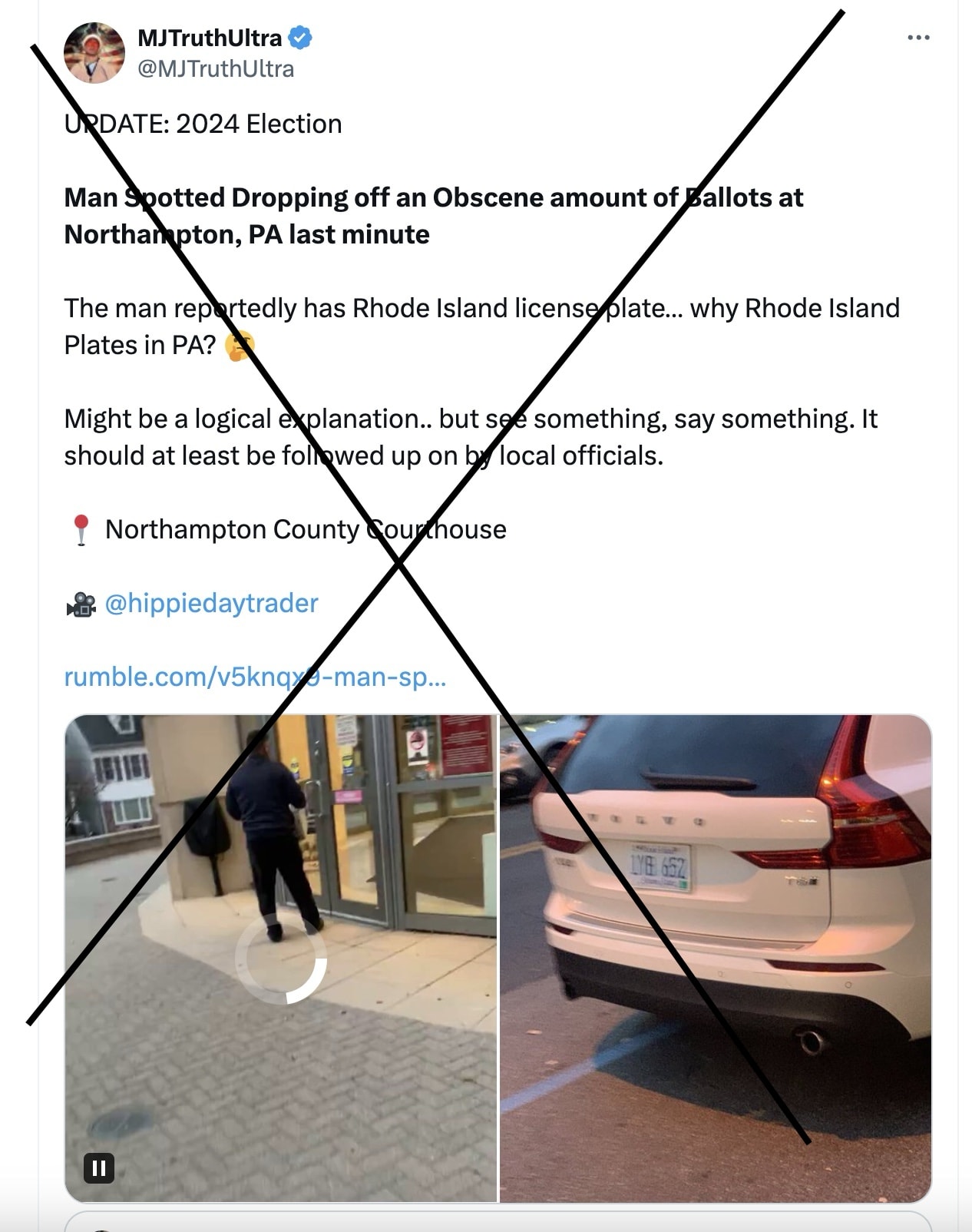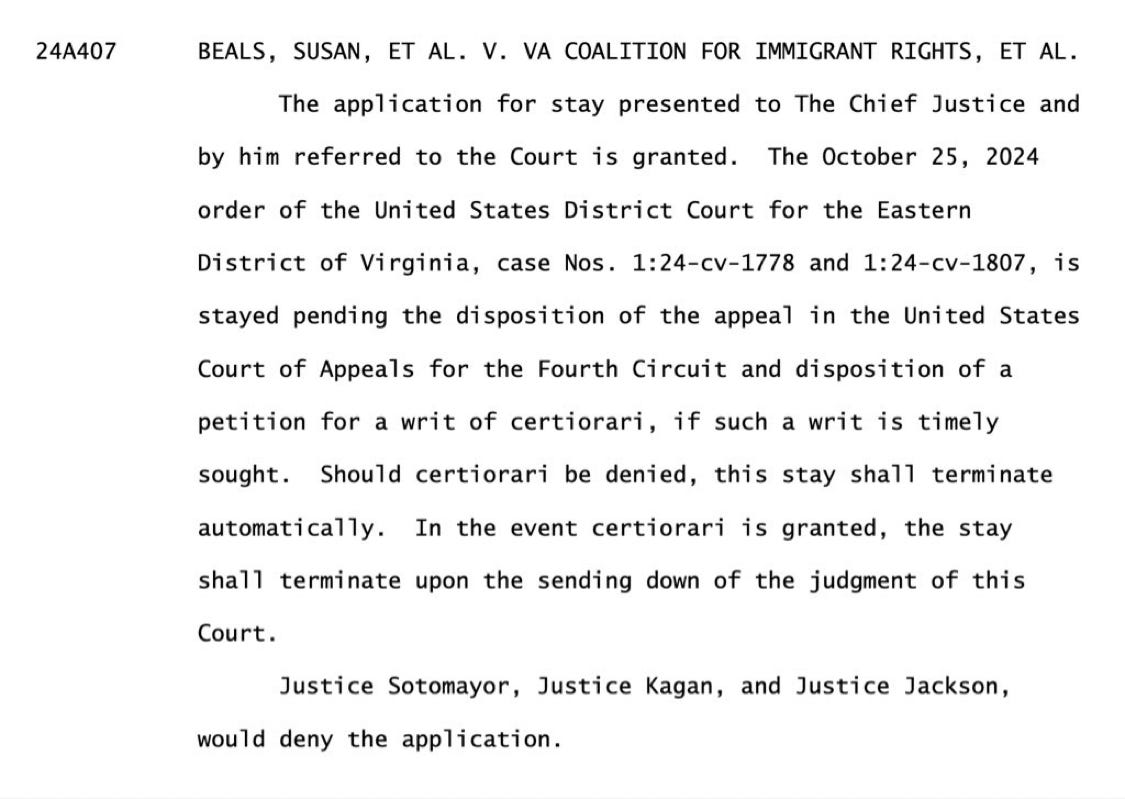|
 |
Donald Trump started his morning with this rant on Truth Social:
It followed a claim he’d made last night that thousands of fraudulent registrations and ballots had been received in York and Lancaster counties. That’s not the case. There is no evidence of fraudulent ballots, although both counties are investigating some potentially bad registrations. That, of course, is exactly what counties are supposed to do, screen out any registration applications from ineligible people so they do not advance to voter roles. There was absolutely nothing to suggest “large scale levels” of cheating “rarely seen before.”
NBC’s senior internet reporter Brandy Zadrozny, who, news-gods willing, will be our guest for Five Questions Friday evening, wrote these incredible words Wednesday: “A viral video posted by a popular QAnon X account, purporting to show evidence of illegal harvesting in Northampton County, Pennsylvania, is in fact video of a postal worker delivering ballots to the elections office.”
Zadrozny reported that a county official told NBC News that the video “showed Charles Narciso, a 25-year veteran of the U.S. Postal Service and the acting postmaster, lawfully bringing ballots into the election office,” and that NBC had verified his identity. That did not stop the story from becoming the most recent lie about election fraud to go viral. The story related that the video had been viewed at least 4.2 million times by Wednesday morning, according to X, and “was shared by conservative influencers and conspiracy theorists. Alex Jones tweeted the video with the caption, ‘They don’t even try to hide it!’”
There are five more days to go before we get to election day. And that’s only Pennsylvania, which also has a mail-in ballot case pending in front of the Supreme Court, Genser v. Butler County Board of Elections, that will determine whether Pennsylvanians whose mail-in ballots are rejected for technical reasons are entitled to vote a provisional ballot in person rather than be completely disenfranchised. If the election is close, it’s possible that those ballots could decide the election.
Wednesday morning, in a disgraceful departure from both federal law and the so-called Purcell principle that SCOTUS uses to reject changes too close to an election, the nation’s highest court permitted Virginia to return to removing voters from the rolls. The Fourth Circuit had made them stop earlier this week. Although there is no written opinion, just the notation below, Justices Sotomayor, Kagan, and Jackson would not have granted the stay.
The facts in the Virginia case are similar to the one in Alabama involving alleged noncitizens, many of whom turned out to be eligible citizen voters. We’ve discussed both situations in recent weeks, including last night. The disenfranchised voters are people who became naturalized citizens at some point, but were not citizens at an earlier point when their status was collected. People become newly minted citizens in this country every day. The case included evidence that U.S. citizens had likely been removed from the rolls.
The states could have used a surgical scalpel to remove only noncitizens from the rolls instead of a blunt force instrument that swept so broadly. The federal law, The National Voter Registration Act (NVRA), requires them to complete purging of voter roles 90 days before the election, which gives them over a year to get it done between the midterm and the general. DOJ explains how that works:
The NVRA limits when States can conduct a general list maintenance program. Under Section 8(c)(2), States must complete any program that systematically removes the names of ineligible voters from the official list of eligible voters no later than 90 days before a primary election or general election for federal office. In other words, once an election for federal office is less than 90 days away, processing and removals based on systematic list maintenance must cease. And, if a State’s federal primary election occurs less than 90 days before a federal general election, the State must complete any systematic-removal program based on change of address for the federal election cycle no later than 90 days prior to the federal primary election: no further systemic activity may take place between the primary and general elections.
After that, it’s pencils down. No more purging. So it should have been clear that Virginia was violating the law, and that seemed to be the case—until it got to the U.S. Supreme Court. They didn’t have to explain their decision, probably a good thing for the conservative justices because it’s hard to figure out what they could say.
What’s actually happening here? In Virginia, people were removed from the rolls if they had ever checked the noncitizen box on a Department of Motor Vehicles form or left it blank. Under the NVRA, states are also required to let people register to vote on the same form they use to get or renew a drivers license or similar, as well as applications for social services. In some small number of cases, noncitizens accidentally register because they’re given bad directions or accidentally check the wrong box. But many of them become citizens at a later date, as the Alabama case, where at least 2,000 of the removed people were determined to be eligible voters, shows. The fact that they become registered this way does not suggest that they actually go ahead and vote. It is still a crime for noncitizens to vote. States “purge” their voter rules for precisely this reason, to catch any errors that slip past in the registration process. But they can’t do it within the quiet period that Congress established precisely to prevent problems like the ones in Alabama and Virginia, where eligible voters were removed along with a small number of ineligible ones.
As American constitutional law scholar and Loyola Law School professor Justin Levitt told me, “You won’t find proof [of noncitizen voting]. Because this is proving that UFOs aren’t landing. What you will find is the repeated absence of any kind of evidence that they are registering or voting in any sizable numbers. Kansas, Colorado, Georgia, North Carolina, etc.—nobody has been able to identify anything other than a handful, despite the fact that there’s a rock-solid paper trail of who votes … At some point, the spectacular failure of anyone to show proof that the UFOs are landing has to kind of refute the notion that the UFOs are landing in big numbers.”
Virginia removed 1600 people from the rolls before they were ordered to stop. Alabama’s Secretary of State acknowledged he removed more than 3,200. Even if every single one of these voters had been ineligible and had voted—neither of which is the case—those votes would not have been significant enough to influence the outcome in either state. But it is up to secretaries of state to do their job within time limits provided by federal law.
When it comes to the Supreme Court, it’s the hypocrisy that gets to me. This Court let Alabama’s legislature get away with an unconstitutionally gerrymandered congressional district for two additional years, invoking the Purcell principle that said it was too close to the election to make any changes that time around. But now, they’ll permit Virginia to remove voters within the time period where federal law strictly prohibits it, not just an amorphous doctrine they invoke when it suits them. And, the state could have been working on these checks for the last few years. Whatever this Virginia decision is, it is not grounded in precedent or principle.
That’s a lot of law for one night. Thanks for sticking with me. And thanks for relying on Civil Discourse for plain talk and explanation of how the law works and intersects with politics. I never imagined that my geekish interest in voting law would become a mainstream topic of conversation in our country. But I’m deeply grateful to those of you who trust me to help explain it and read the newsletter.
We’re in this together,
Joyce




No comments:
Post a Comment
Note: Only a member of this blog may post a comment.